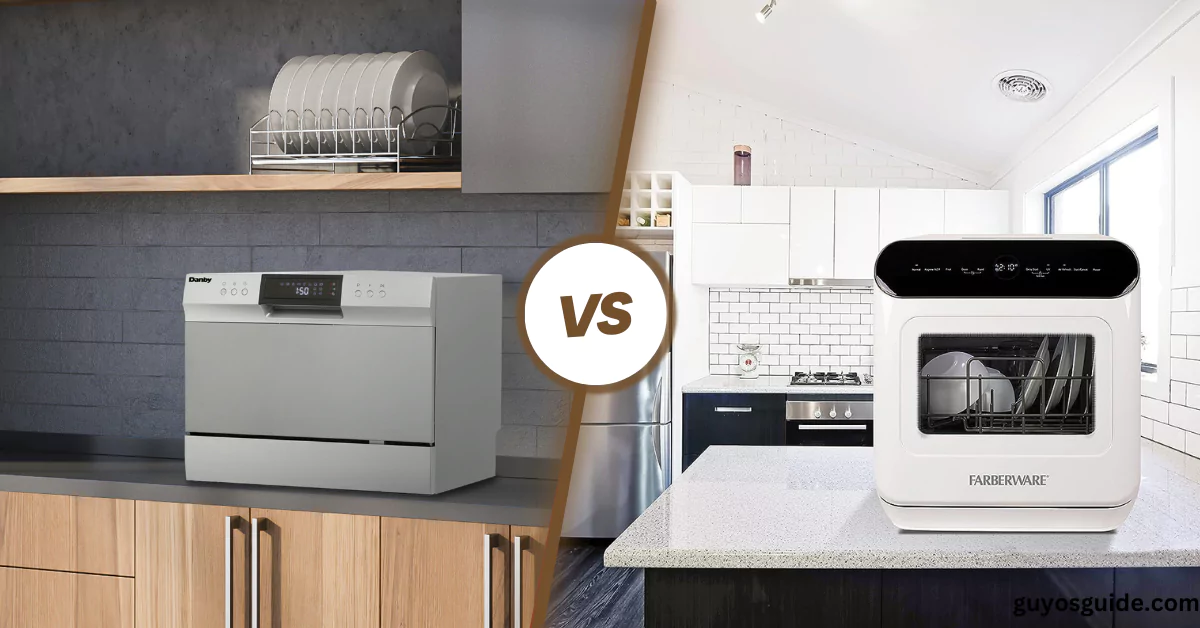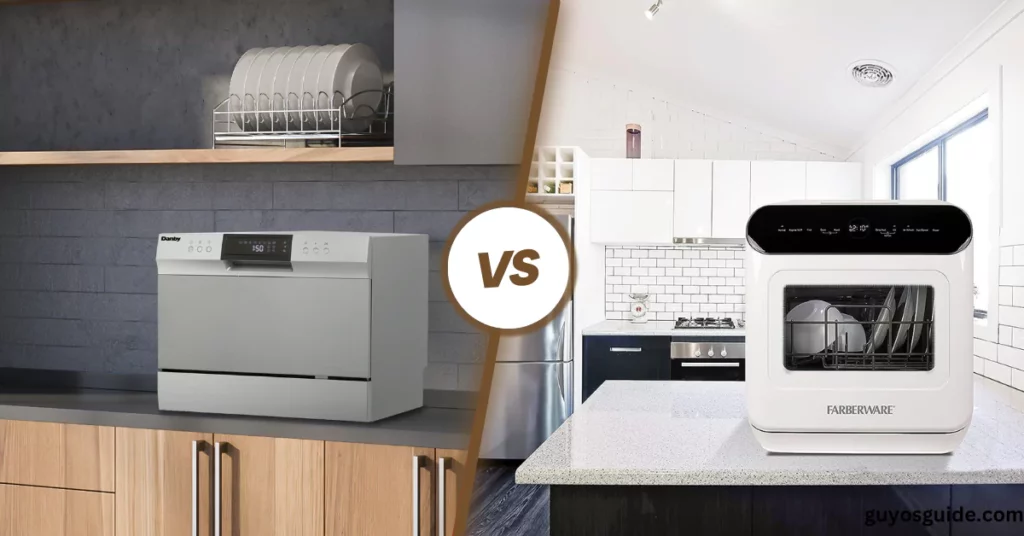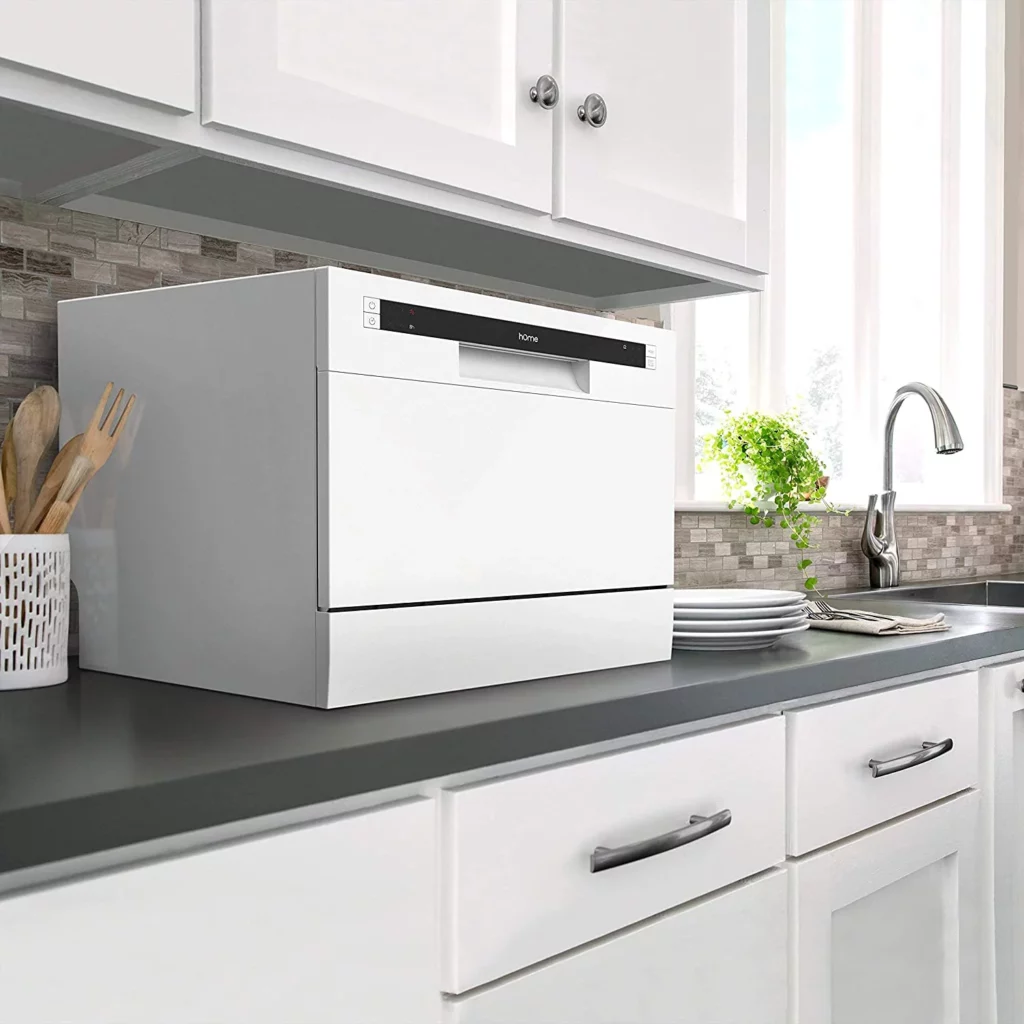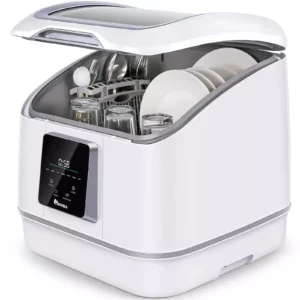Countertop Dishwasher vs Portable Dishwasher (Comparison)

Some of the links in this post are affiliate links, meaning, at no additional cost to you, We will earn a commission if you click through and make a purchase.

When it comes to choosing a dishwasher for your kitchen, the decision often boils down to countertop dishwashers and portable dishwashers.
Both offer unique features and benefits that cater to different needs.
Understanding the differences between these two options can help you make an informed decision that suits your lifestyle and space constraints.
In this article we’ll delve into the comparison of countertop dishwashers vs. portable dishwashers, highlighting their key distinctions and helping you determine which option is best for your home.
Countertop Dishwasher

A countertop dishwasher is a compact and portable dishwasher designed to sit on kitchen countertops.
It provides a convenient and space-saving solution for washing dishes without the need for built-in or under-counter installation.
The primary purpose of a countertop dishwasher is to offer a smaller, more flexible option for individuals or households with limited kitchen space or those who do not require a full-size dishwasher.
Features and Characteristics of a Countertop Dishwasher:
- Compact Size: Countertop dishwashers are smaller in size compared to traditional dishwashers, making them suitable for kitchens with limited space.
- Portability: These dishwashers are often portable, allowing users to move them around as needed or even take them on the go for RVs or small apartments.
- Easy Installation: Countertop dishwashers are designed for easy installation without the need for professional plumbing. They usually connect to the kitchen faucet for water intake.
- Limited Capacity: Due to their compact size, countertop dishwashers have a smaller capacity, accommodating fewer dishes compared to full-size models.
- Energy-Efficient: They are generally more energy-efficient than larger dishwashers, using less water and electricity for smaller loads.
- User-Friendly Controls: Countertop dishwashers typically feature user-friendly controls on the front panel, allowing users to select wash cycles and adjust settings.
Advantages and Disadvantages of Using a Countertop Dishwasher:
Advantages:
- Space-Saving: Countertop dishwashers are ideal for kitchens with limited space, providing a space-saving alternative to traditional dishwashers.
- Portability: The portability of these dishwashers allows users to easily move them around or take them to different locations, such as temporary living spaces or RVs.
- Easy Installation: They are easy to install without complex plumbing or professional assistance.
- Energy-Efficient: Countertop dishwashers are often more energy-efficient, consuming less water and electricity for smaller loads.
Disadvantages:
- Limited Capacity: The smaller size means that countertop dishwashers have a limited capacity, requiring more frequent washing for larger households.
- Not Ideal for Large Items: Larger items such as big pots and pans may not fit well in a countertop dishwasher due to its limited space.
- Manual Water Connection: Some models require a manual connection to the kitchen faucet, which may be less convenient than a permanent water connection.
Portable Dishwasher

A portable dishwasher is a standalone and movable dishwasher unit designed for easy transport and installation in various locations within a kitchen.
Unlike built-in or countertop models, portable dishwashers can be connected to the kitchen faucet, making them versatile and suitable for renters or individuals who don’t have the option for permanent installations.
The primary purpose of a portable dishwasher is to provide a convenient and efficient solution for dishwashing without the need for a fixed, built-in unit.
Features and Characteristics of a Portable Dishwasher:
- Rolling Casters: Portable dishwashers often come equipped with rolling casters, allowing users to move them around the kitchen as needed.
- Compact Design: While larger than countertop models, portable dishwashers are more compact than built-in units, providing a balance between capacity and space efficiency.
- Connects to Faucet: These dishwashers can be connected to the kitchen faucet for water intake, eliminating the need for permanent plumbing modifications.
- Similar Capacity to Built-In Models: Portable dishwashers typically offer a similar capacity to built-in models, accommodating a larger number of dishes compared to countertop models.
- User-Friendly Controls: They feature user-friendly controls on the front panel, allowing users to select wash cycles and adjust settings.
- Interior Racks and Shelves: Portable dishwashers have interior racks and shelves similar to built-in models, providing organized space for different types of dishes.
Advantages and Disadvantages of Using a Portable Dishwasher:
Advantages:
- Portability: The primary advantage is the ability to move the dishwasher around the kitchen or take it to different locations, providing flexibility.
- No Permanent Installation: Portable dishwashers do not require permanent installation, making them suitable for renters or individuals with limited modification options.
- Similar Capacity to Built-In Models: They offer a larger capacity compared to countertop models, accommodating more dishes per load.
- User-Friendly Installation: Portable dishwashers are easy to install, typically requiring only a connection to the kitchen faucet and a power source.
Disadvantages:
- Space Requirement: While more flexible than built-in models, portable dishwashers still require space in the kitchen and may need to be rolled away when not in use.
- Manual Faucet Connection: Some models require a manual connection to the kitchen faucet, which may be less convenient than a permanent water connection.
- Not as Seamless as Built-In Models: Portable dishwashers are not as seamlessly integrated into the kitchen as built-in models and may have a less polished appearance.
Comparison Between a Countertop Dishwasher and a Portable Dishwasher
| Feature | Countertop Dishwasher | Portable Dishwasher |
|---|---|---|
| Installation | Typically sits on the countertop | Can be moved around and connected as needed |
| Size | Compact, designed for smaller kitchen spaces | Larger and more mobile, suitable for various locations |
| Capacity | Smaller capacity, suitable for singles or small households | Larger capacity, can handle more dishes and utensils |
| Plumbing Requirements | Often requires a dedicated faucet connection | Can connect to a sink faucet or a separate water source |
| Portability | Limited mobility, usually stays in one location | Larger capacity can handle more dishes and utensils |
| Energy Efficiency | Generally more energy-efficient | Efficiency may vary, depending on the model |
| Cost | Typically more affordable than portable models | May be more expensive, especially for larger capacities |
| Installation Cost | Usually easier to install and may not require professional help | May need professional installation, especially for permanent connections |
FAQs
Are countertop dishwashers as effective as portable dishwashers in cleaning dishes?
Both countertop and portable dishwashers have similar cleaning capabilities. The main difference lies in their size and capacity.
How much space do countertop dishwashers and portable dishwashers occupy?
Countertop dishwashers are compact and designed for smaller kitchens, while portable dishwashers are slightly larger and typically have wheels for easy mobility.
Can countertop dishwashers be connected to the kitchen faucet?
Yes, many countertop dishwashers can be connected to the kitchen faucet for water supply. This feature adds to their convenience.
Do portable dishwashers require permanent installation?
Portable dishwashers do not require permanent installation. They can be easily connected to the kitchen faucet and do not need a dedicated water line.
How much water and energy do countertop and portable dishwashers use?
Countertop and portable dishwashers are generally designed to be energy-efficient and use less water compared to traditional built-in dishwashers.
Can countertop dishwashers accommodate larger pots and pans?
The capacity of countertop dishwashers is more limited, so they may need help accommodating larger items. Portable dishwashers, being larger, can handle bigger loads.
Are there any specific detergent requirements for countertop and portable dishwashers?
Generally, both types of dishwashers use standard dishwasher detergents. However, it’s essential to follow the manufacturer’s recommendations for the specific model.
Are there any noise differences between countertop and portable dishwashers?
Noise levels can vary between models, but in general, both countertop and portable dishwashers are designed to operate quietly.
Wrap Up
Choosing between a countertop dishwasher and a portable dishwasher depends on your lifestyle, kitchen space, and preferences.
Countertop dishwashers offer compact convenience for smaller kitchens, while portable dishwashers provide mobility and greater capacity.
Both are efficient solutions, but the final decision rests on finding the balance that suits your unique needs.
Whether it’s the space-saving charm of a countertop model or the versatility of a portable unit, upgrading your dishwashing routine has never been more tailored to personal choice.






